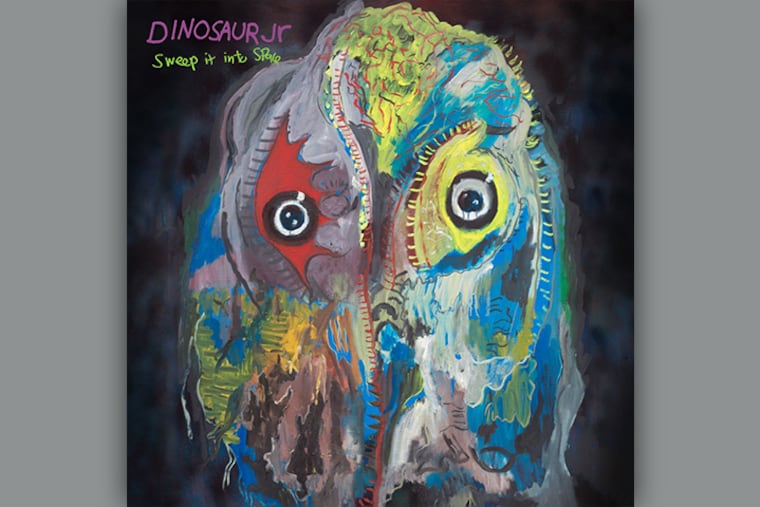Dinosaur Jr. and Kurt Vile have reconnected for a rocking new release
Vile coproduced Dinosaur Jr.'s "Sweep It Into Space," and he plays 12-string guitar on one track. Eric Church and Toumani Diabaté also have noteworthy new releases.

Dinosaur Jr.
Sweep It Into Space
(Jagjaguwar ***)
It was only a matter of time before Kurt Vile and J Mascis got around to working on an album together. Vile was a Dinosaur Jr. fan growing up in Lansdowne in the 1990s, and his loose, discursive style as a singer-guitarist owes a significant debt to the sound Mascis patented on the group’s 1987 album, You’re Living All Over Me.
Vile is credited as coproducer on the new Sweep It Into Space, the fifth album that Dinosaur Jr. has released since Mascis reconvened the original lineup of drummer Patrick Murphy and bassist Lou Barlow. Vile also plays 12-string guitar on “I Ran Away,” a bright, springy ditty that sounds for all the world like a Kurt Vile song.
The circle of influence isn’t seamless, however. Vile — who has announced that his next album will be on the storied jazz label Verve — began work on Sweep It in late 2019, but the COVID-19 pandemic prevented him from finishing at Dino headquarters in Amherst, Mass. Instead, Mascis completed the album on his own.
Dinosaur Jr. is unquestionably Mascis’ band, and he deserves props for maintaining remarkable quality control over a 35-year period. His lazy drawl is as inviting as ever on Sweep It, whether he’s singing over the cascading chords of “I Ain’t” or the AC/DC churn of “I Met the Stones.”
But credit for this melodically enticing and satisfyingly rocking new release must also go to Barlow, who penned the single “Garden” and the lovely psych-rock closer “You Wonder,” fulfilling his two-songs-per-album quota like Keith Richards on a quality Rolling Stones LP.
— Dan DeLuca
Eric Church
Heart (** 1/2 )
Soul (***)
(EMI Nashville)
“I need a melody without a memory,” Eric Church sings on “Russian Roulette” from Heart, one of his two new albums. While revisiting a favorite topic — the power of music and radio — the country star is making a sly reference to his terrific 2011 hit “Springsteen,” in which he observed, “Funny how a melody sounds like a memory.”
Nothing on Heart, however, surpasses past glories or breaks ground, and the set suggests that the talented Church might benefit from a break from his longtime cast of cowriters and from his producer, the estimable Jay Joyce.
“Heart on Fire” is the kind of swaggering country-rocker Church excels at, and “People Break” is a finely wrought mid-tempo ballad. (“The ice on Hawk Lake this time of year/ Broken and busted like my bathroom mirror/ So hard to see what lies beneath/ Shattered reflections like the pieces of me.”)
But the most powerful track is one Church didn’t have a hand in writing: “Stick That in Your Country Song” is a searing indictment of the banality of most mainstream fare.
Soul features the same players, writers, and producer, but it’s more engaging largely because the arrangements tend to be more soulful and funky. That starts with the sinuous, slide-accented groove of “Rock and Roll Found Me.” And the brash, rocking “Break It Kind of Guy” introduces some welcome twang to the proceedings.
Wisely, Church — who is scheduled to play the Wells Fargo Center Oct. 9 — again brings in backup singer Joanna Cotten for both albums. Her soul-drenched contributions elevate even the most pedestrian material and undercut the occasional bursts of macho bluster.
— Nick Cristiano
Toumani Diabaté and the London Symphony Orchestra
Kôrôlén
(World Circuit, *** 1/2)
Mali’s Toumani Diabaté is a master of the 21-string West African kora. Diabaté has released many celebrated albums: of solo kora work, with his Symmetric Orchestra of fellow griots, and in collaborations — notably with Malian guitarist Ali Farka Touré and American bluesman Taj Mahal. He also guested on Bjork’s Volta.
Kôrôlén documents a 2008 performance at London’s Barbican Centre by Diabaté's Symmetric Orchestra and the London Symphony Orchestra. It’s a thoughtful, engrossing work of synergy and synthesis.
Diabaté's kora creates precise, crystalline notes in the foreground, both in meditative, circular patterns and in sudden lightning-fast arpeggios. His compositions here, several of which appeared on albums such as The Mande Variations and the Grammy-winning In the Heart of the Moon, often build on traditional folk tunes but provide a lot of room for improvisation over the course of their seven or so minutes.
An orchestra, of course, isn’t built for improvisation. But conductor Clark Rundell and the arrangers here — Britain’s Ian Gardner and America’s Nico Muhly — find ways for it to recede to the background and then build on a melody so that it interacts with Diabaté's kora.
Muhly’s three arrangements tend to be more coloristic and ambient than Gardner’s three, which are more assertive, but always the interplay is fascinating. Kôrôlén is a complex work of calm beauty that rewards close listening.
— Steve Klinge